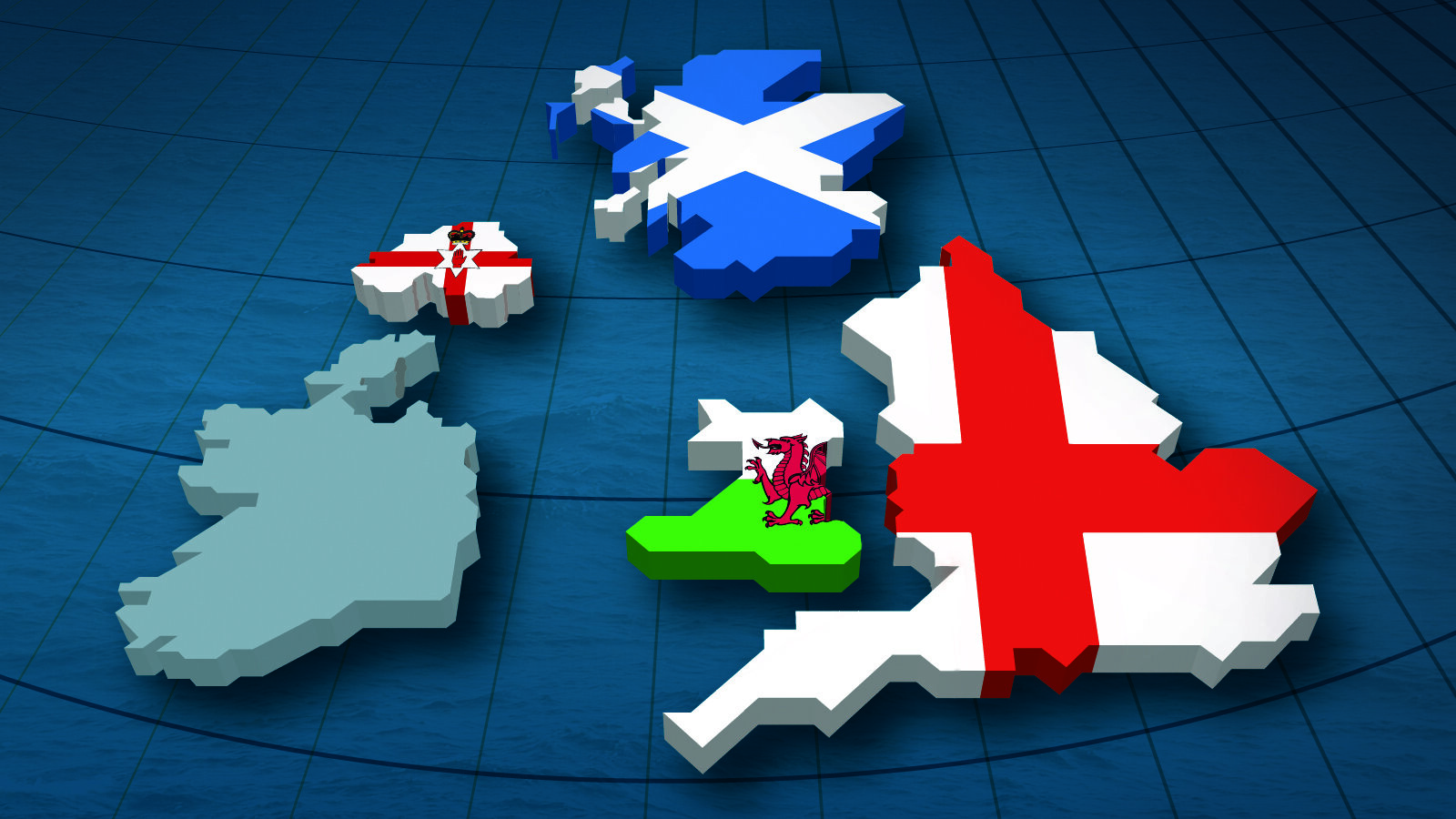The End of the United Kingdom?
On May 6, 2021, Scotland will elect a new parliament - Prof. Dr. Klaus Stolz, Professorship of British and American Cultural/Social Studies at Chemnitz University of Technology, looks at the upcoming parliamentary election in Scotland and its possible consequences.
-

The four nations that make up the United Kingdom today - England, Scotland, Wales and Northern Ireland - became part of the Union at different times and under different conditions. Are they now drifting apart? Graphic: Jacob Müller -

Prof. Dr. Klaus Stolz: "The United Kingdom is facing an existential constitutional crisis." Photo: Press Office Photo Archive/Christine Kornack
On May 6, 2021, Scotland will elect a new parliament. In recent weeks, the party landscape has changed yet again. The two existing pro-independence parties, the ruling Scottish National Party (SNP) and the Greens, are joined by an additional force. The controversial former prime minister Alex Salmond has founded a new independence party, Alba (Gaelic for Scotland), with whose help he intends to clear the list seats that remain closed to the SNP because of the presumably large number of directly won constituency mandates. The goal is a super majority for independence in the next parliament.
In fact, current polls leave no doubt that the SNP will remain the strongest force and, with Nicola Sturgeon, will once again provide the prime minister. It is very likely that she will also be able to count on a majority of pro-independence supporters in Parliament. However, a good performance by Alba would dash her hopes of an absolute majority for the SNP. In such a case, the personal animosities between the two party leaders as well as existing ideological and strategic differences would strongly restrict the capacity of an SNP minority government to follow its independence plan.
Whether as a clear solo voice or in the form of a discordant polyphonic chorus, the calls for Scottish independence will once again become much louder. The next open confrontation between the Scottish and British governments is already in sight. The dispute over Scotland's future position is based on opposing ideas about the nature of the multinational British state and its rules of the game. The United Kingdom faces an existential constitutional crisis.
The British state is a peculiar entity. The four nations that make up the United Kingdom today - England, Scotland, Wales, and Northern Ireland - became part of the Union at different times and under different circumstances. Nevertheless, in formal legal terms, sovereignty rests solely with the British Parliament at Westminster, which is not bound by anything, not even its previous decisions. This unitary doctrine also applies in relation to the parliaments in Scotland, Wales, and Northern Ireland, which were created in 1999 under Tony Blair as part of the devolution programme. It allows Westminster, and thus the British government itself, to encroach on areas of competence explicitly reserved for these parliaments or even to abolish them.
This formal constitutional view, however, contrasts with a widely accepted political idea of the United Kingdom as a union of nations that preserves the identity of its distinct parts. This concept has long prohibiteds both an assimilationist British nation-building and an immediate recourse to the absolute rights of sovereignty derived from English constitutional traditions. On the contrary, for Scotland this includes a fundamental right to self-determination that can be exercised both within and outside the Union. Moreover, the first independence referendum held in 2014 - just like the formal assurance of majority self-determination for Northern Ireland by the British government (in the Good Friday Agreement of 1998) – is often seen as a precedent reflecting a general right of self-determination for British nations.
Indeed, British territorial politics has been characterized for centuries by this tension between the unitary doctrine and unionist realpolitik. Eventhough the concrete negotiation process has never been frictionless, the dynamic balance of integration and autonomy is one of the central reasons why the union has not been seriously questioned for a long time.
However, with Brexit and especially with Boris Johnson as prime minister, these achievements of British pragmatism have been increasingly lost. During Brexit, the unitary character of the United Kingdom was uncompromisingly enforced for everyone to see. Against a clear majority in Scotland and Northern Ireland, the entire country was led out of the EU, and even during the Brexit negotiations, the dissenting attitude in Scotland played no role. Finally, in the repatriation of EU legislative competencies, powers originally designated or Scotland and Wales (including agriculture, fisheries, environmental protection, and animal welfare) were handed over to the British Parliament in Westminster against the declared will of the two devolved parliaments, but with supreme court approval. A roll-back of the devolution legislation is thus not only formally possible, but also possible in terms of realpolitik. The fact that Boris Johnson described devolution in an interview as the Blair government’s biggest mistake fits the picture and does not exactly increase the Scots’ confidence in the British government. An aggressive neo-Unionism, which for the first time evokes something like a unified British identity, has replaced the old unionism based on multiple identities.
After the Scottish parliamentary elections, the two positions will clash head-on. Scottish nationalists will argue that their election victory would give them a clear democratic mandate to hold another independence referendum. The bill to hold the referendum has already been written and could be passed in the Scottish Parliament immediately after the election. Boris Johnson would probably be able to take it back to get a court order against it.. Nicola Sturgeon and the SNP are not expected to hold an unapproved referendum like the one in Catalonia, even though there are certainly supporters of this among SNP activists The new Scottish government will rather rely on the fact that the permanent refusal of the British government would further increase the existing slim independence majority. If Alex Salmond's Alba Party is needed to secure a majority, however, Sturgeon would be under tremendous pressure to abandon her restrained course. In London, on the other hand, the hope is for a permanent split and a fading of the independence movement.
Regardless of the outcome of this conflict, however, the Union already seems to be at an end. The line has been crossed; the point of no return has been passed. Party-political division in Scotland and tactical skill on the part of the British government could prevent Scottish secession for the time being, but a return to the status quo ante is difficult to imagine. Meanwhile resentment is also stirring in other parts of the country. With the de facto customs border in the Irish Sea the Protestant Unionist community in Northern Ireland is moving away from London and the Conservatives. A reunification of Ireland is closer than ever. In Wales, polls have shown over 40 percent support for independence for the first time ever. And even in England, the union is passé. A large proportion of the English, especially in the Conservative camp, see a secession of Scotland as a price they are willing to pay for Brexit. The old unionism is dead - in all parts of the country. Developments in just one of the current trouble spots could trigger a domino effect at any time. The unitarian constitutional doctrine alone will not hold the United Kingdom together in the long run.
(Author: Prof. Dr. Klaus Stolz, Professor of British and American Cultural/Social Studies at Chemnitz University of Technology / Translation: Chelsea Burris)
Matthias Fejes
04.05.2021





